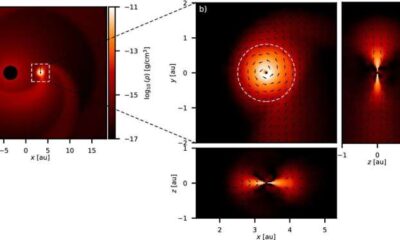Health
Transforming Vision Health: Dietary Changes and Migraines

Dr. Rani Banik, a neuro-ophthalmologist, has shared her transformative journey from suffering debilitating migraines to discovering how nutrition and lifestyle changes can significantly improve vision health. For years, she experienced daily pain, describing her migraines as feeling like “starting with an icepick in my head.” Despite consulting leading headache specialists and trying every available medication, relief remained elusive until her early 40s.
Through her professional expertise and personal challenges, Dr. Banik learned that dietary adjustments, targeted supplements, and effective stress management could alleviate her migraines and enhance her overall well-being. This revelation not only shaped her recovery but also informs her current approach to treating patients with similar conditions.
Connecting Migraines and Vision Health
Dr. Banik emphasizes the connection between migraines, dry eyes, and age-related vision problems, suggesting that these issues often share underlying pathways. Her findings highlight that making small, consistent changes in everyday habits can lead to significant improvements in health outcomes. This interconnectedness underscores the importance of a holistic approach to healthcare.
Diet plays a pivotal role in managing chronic conditions such as migraines. Dr. Banik recommends incorporating a variety of nutrient-rich foods, emphasizing the value of antioxidants, omega-3 fatty acids, and vitamins that support eye health. Additionally, she advocates for staying hydrated and minimizing processed foods, which can trigger inflammatory responses.
In her practice, Dr. Banik often discusses the benefits of specific supplements that can aid in reducing migraine frequency and severity. These include magnesium, riboflavin (vitamin B2), and coenzyme Q10. Evidence suggests that these nutrients can play a significant role in neurological health and may help prevent migraine attacks.
The Role of Stress Management
Stress is another significant factor that can exacerbate migraines and other vision-related issues. Dr. Banik encourages patients to explore stress-reducing techniques, such as mindfulness meditation, yoga, and regular physical activity. These practices not only help in managing migraine symptoms but also promote overall eye health by improving circulation and reducing tension.
Dr. Banik’s insights reflect a growing recognition of the importance of lifestyle factors in managing chronic health conditions. As research continues to evolve, the medical community is increasingly acknowledging the role of personalized care that includes dietary and lifestyle interventions. By addressing these elements, patients can take an active role in their health and potentially reduce the burden of chronic conditions.
For individuals suffering from migraines or age-related vision problems, Dr. Banik’s approach offers a hopeful perspective. Through informed dietary choices and proactive lifestyle adaptations, it is possible to achieve a better quality of life and improved vision health. Her commitment to integrating personal experience with professional knowledge exemplifies a compassionate and effective method of patient care.
As awareness grows around the impacts of nutrition and lifestyle on health, more individuals may find relief from conditions previously thought to be managed solely through medication. Dr. Banik’s journey serves as an inspiring reminder of the power of holistic health practices in the face of chronic challenges.
-

 Science1 month ago
Science1 month agoOhio State Study Uncovers Brain Connectivity and Function Links
-

 Politics2 months ago
Politics2 months agoHamas Chief Stresses Disarmament Tied to Occupation’s End
-

 Science1 month ago
Science1 month agoUniversity of Hawaiʻi Joins $25.6M AI Project for Disaster Monitoring
-

 Entertainment1 month ago
Entertainment1 month agoMegan Thee Stallion Exposes Alleged Online Attack by Bots
-

 Science4 weeks ago
Science4 weeks agoALMA Discovers Companion Orbiting Giant Star π 1 Gruis
-

 Science2 months ago
Science2 months agoResearchers Challenge 200-Year-Old Physics Principle with Atomic Engines
-

 Entertainment1 month ago
Entertainment1 month agoPaloma Elsesser Shines at LA Event with Iconic Slicked-Back Bun
-

 World1 month ago
World1 month agoFDA Unveils Plan to Cut Drug Prices and Boost Biosimilars
-

 Business1 month ago
Business1 month agoMotley Fool Wealth Management Reduces Medtronic Holdings by 14.7%
-

 Top Stories2 months ago
Top Stories2 months agoFederal Agents Detain Driver in Addison; Protests Erupt Immediately
-

 Entertainment1 month ago
Entertainment1 month agoBeloved Artist and Community Leader Gloria Rosencrants Passes Away
-

 Science2 months ago
Science2 months agoInnovator Captures Light at 2 Billion Frames Per Second







